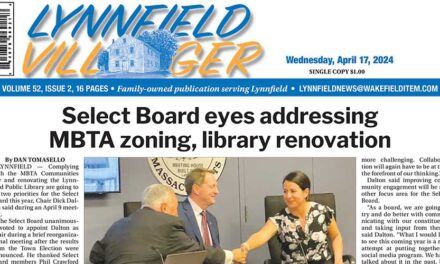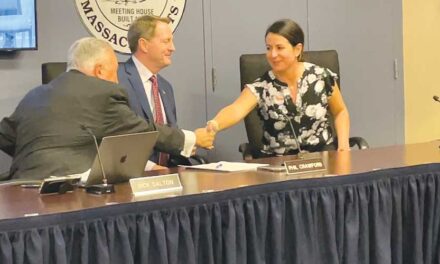Published in the April 5, 2017 edition
By MAUREEN DOHERTY
LYNNFIELD — Board of Selectmen and Finance Committee held its annual joint public hearing on the Fiscal Year 2018 budget Monday night.
The meeting was sparsely attended in comparison with other years, which may have been attributable partly to the fact that the Lynnfield Center Water District (LCWD) was holding its annual meeting on the controversial topic of whether to return to the practice of fluoridating the district’s water. About 65 residents attended that meeting and the water will be fluoridated once again.
After the joint session ended, the FinCom members met to discuss the budget and ultimately endorsed Town Administrator Jim Boudreau’s recommended budgets totaling $53.2M for the FY18 operating budget and the $1,796,418 capital budget.
The FinCom also discussed various warrant article recommendations or whether certain articles would need to be deferred until its meeting held immediately prior to the April 24 Town Meeting or on the floor of Town Meeting itself.
During the joint public hearing, FinCom Chairman Jack Dahlstedt went through the operating and capital budgets line by line, providing residents with an opportunity to speak on issues of concern to them during the hearing and provided for general comments at the end before the joint session ended.
Wallace McKenzie asked why the Board of Selectmen is the only board in town that regularly posts its materials and engages the public about its upcoming meetings through email notifications whereas other boards and commissions require the public to ferret out this information themselves. He’d like to see the town take advantage of the software available to do this.
McKenzie was also concerned about the potential impact a tax abatement sought by National Development due to a challenge to the valuation of its property could have on future town budgets.
Boudreau said the outcome of that abatement hearing was not yet known when he spoke to the chief assessor earlier in the day.
Selectmen Chairman Phil Crawford said that the town has a budgeted amount set aside to cover abatement requests each year. Funds that are not used are returned to the town.
McKenzie asked what would happen if National Development was given an abatement of $500,000. Crawford said, “It would be an adjustment on a future budget.”
Boudreau explained that “MarketStreet is contesting their value, so if you reduce their value the entire value of the town comes down.”
Dahlstedt added that in the example used, that $500,000 loss in revenue from the value of those taxable assets would get “spread among 4,000 households.”
Under the school budget line item, Patricia Campbell reiterated her perennial concern that the town spends too much money on buses that are not filled with students. She believes the town may need to have either fewer buses or smaller buses “to better fit the amount of children we are picking up.”
Dahlstedt reassured her that the FinCom subcommittee to the school department had lengthy discussions on how they manage the capacity of the students on the buses and added that the town’s new DPW Director, John Tomasz, is very interested in “understanding the balance between what we own and what we sub out.”
Dahlstedt added that the town may have reached its “tipping point” where it no longer makes sense to contract out much of its bus services due to the alarming increases in the contract over the past few years.
Campbell also asked whether the Senior Center van (that will be included in the capital budget) would be equipped with three-point restraints rather than just hip belts because it is taken on the highway.
Under the budgets for the library and recreation, respectively, Campbell asked for more programming for those over 50, those without children or empty nesters, pointing out that Senior Center services cannot be used before age 60.
Campbell also commented that it appears there are more school administrative positions being created each year, which are very expensive, and as a retired teacher she does not see the benefit of such emphasis on “top down leadership.” She is also concerned by increases she has seen in administrative salaries for specialists and often sees a correlation between a bump in a salary and an administrator’s planned retirement a few years down the road.
Selectman Dick Dalton asked Boudreau why there was still $50,000 slated for the “pay increase fund” if the town’s contracts have been settled. Boudreau said one contract with the police dispatchers still has not been settled. This line item is also used for two other purposes, he said: to cover any potential math errors in salaries and “the department head bonus pool” is funded through this line item as well.
Campbell referred to the town’s OPED debt of $70M as the “elephant in the room,” adding that, “it doesn’t console me that other towns have the same problem…people ought to know we have a severe indebtedness for our retirees,” she said.
Dahlstedt said that those who work in the industry understand this issue all too well, but he explained that the town also pays its obligations to retirees year to year and the trust would only come into play if the town became unable to fulfill its obligations.
“I personally believe there will be more guidance in the next few years,” he said, adding that he was initially “skeptical about creating a trust specifically for OPED,” noting he was overruled on that point. “We are putting away what we can,” he said. Additionally, in the future the way the town structures this liability will “diminish” because of “how we are contracting with our current employees,” he said.
It is being recommended that the town transfer $300,000 to the OPED trust in FY18, which is $100,000 more than the town deposited in FY17 from the operating budget.




